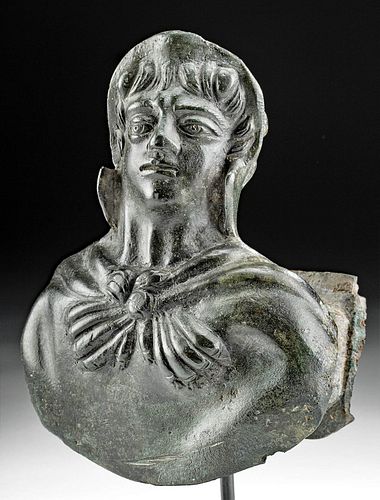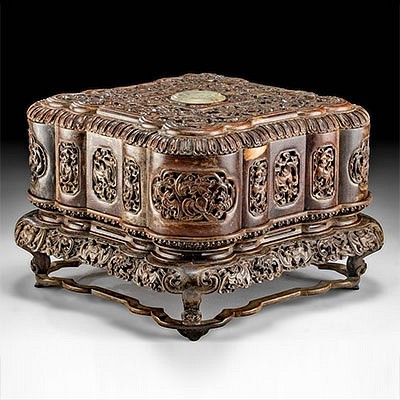Roman Bronze Herakles Attachment, ex-Royal Athena
Lot 17c
About Seller
Artemis Fine Arts
686 S Taylor Ave, Ste 106
Louisville, CO 80027
United States
Selling antiquities, ancient and ethnographic art online since 1993, Artemis Gallery specializes in Classical Antiquities (Egyptian, Greek, Roman, Near Eastern), Asian, Pre-Columbian, African / Tribal / Oceanographic art. Our extensive inventory includes pottery, stone, metal, wood, glass and textil...Read more
Categories
Estimate:
$6,000 - $9,000
Absentee vs Live bid
Two ways to bid:
- Leave a max absentee bid and the platform will bid on your behalf up to your maximum bid during the live auction.
- Bid live during the auction and your bids will be submitted real-time to the auctioneer.
Bid Increments
| Price | Bid Increment |
|---|---|
| $0 | $25 |
| $300 | $50 |
| $1,000 | $100 |
| $2,000 | $250 |
| $5,000 | $500 |
| $10,000 | $1,000 |
| $20,000 | $2,500 |
| $50,000 | $5,000 |
| $100,000 | $10,000 |
| $200,000 | $20,000 |
About Auction
By Artemis Fine Arts
Apr 8, 2021
Set Reminder
2021-04-08 10:00:00
2021-04-08 10:00:00
America/New_York
Bidsquare
Bidsquare : Fine Antiquities | Asian | Ethnographic Art
https://www.bidsquare.com/auctions/artemis-gallery/fine-antiquities-asian-ethnographic-art-6770
Features classical antiquities, ancient and ethnographic art from cultures encompassing the globe. Egyptian, Greek, Roman, Etruscan, Near Eastern, Asian, Pre-Columbian, Native American, African / Tribal, Oceanic, Spanish Colonial, Russian, Fine Art, so much more! All legally acquired, legal to sell. Artemis Fine Arts info@artemisgallery.com
Features classical antiquities, ancient and ethnographic art from cultures encompassing the globe. Egyptian, Greek, Roman, Etruscan, Near Eastern, Asian, Pre-Columbian, Native American, African / Tribal, Oceanic, Spanish Colonial, Russian, Fine Art, so much more! All legally acquired, legal to sell. Artemis Fine Arts info@artemisgallery.com
- Lot Description
Roman, Imperial Period, ca. 1st to 4th century CE. A finely cast form of a bust of Hercules (Herakles) with a cloak and hood made from the body of the Nemean lion. Extending from the back of the bust is a square attachment to add this piece to a chariot. Well done details give Hercules a sensitive and naturalistic face; other notable details are the lion's paws hanging over the end of his cloak, complete with tiny claws, and the powerful muscles depicted in Hercules' neck. This is a large attachment, probably placed onto the end of an axle. It has clear signs of use. Size: 3.35" L x 4.5" W x 5.2" H (8.5 cm x 11.4 cm x 13.2 cm)
The story of Hercules was a popular one in ancient Rome (with much of it derived, as so many elements of Roman culture were, from Greece - entering Roman culture by way of Etruria). Both Mark Antony and the Emperor Commodus considered him to be a personal patron god. The story of Hercules and the Nemean Lion was retold over and over again, in plays and artistic depictions like painting on vases. As part of his labors, Hercules was sent by King Eurystheus to bring him the skin of a lion that was terrorizing the town of Nemea. Upon discovering that weapons would not work on the beast, he tracked it to its lair and strangled it.
Provenance: Ex-Private Los Angeles, California, USA collection acquired at the Dorotheum, Vienna, Austria in September 1998; ex Royal Athena Gallery, New York City, New York, USA;
All items legal to buy/sell under U.S. Statute covering cultural patrimony Code 2600, CHAPTER 14, and are guaranteed to be as described or your money back.
A Certificate of Authenticity will accompany all winning bids.
We ship worldwide and handle all shipping in-house for your convenience.
#118457Small repair and loss to the attachment area with signs of wear/use; details of the bust are in excellent condition.Condition
- Shipping Info
-
All shipping is handled in-house for your convenience. Your invoice from Artemis Gallery will include shipping calculation instructions. If in doubt, please inquire BEFORE bidding for estimated shipping costs for individual items.
-
- Buyer's Premium



 EUR
EUR CAD
CAD AUD
AUD GBP
GBP MXN
MXN HKD
HKD CNY
CNY MYR
MYR SEK
SEK SGD
SGD CHF
CHF THB
THB














